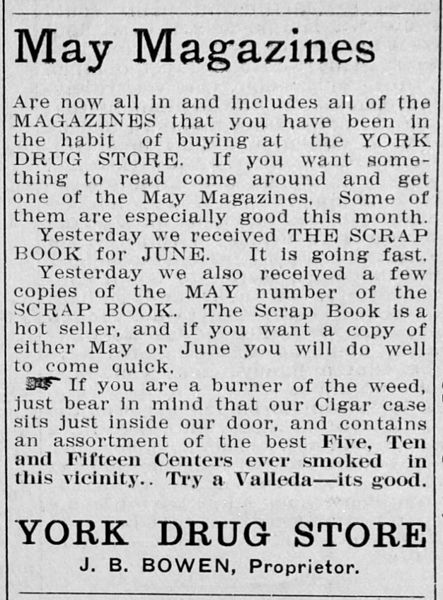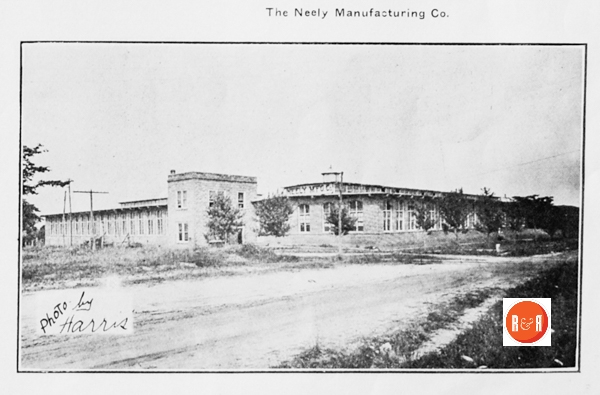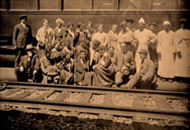Recently, some friends of the Museum of Western York County were looking through some of their mother’s old papers and pictures and sent some very interesting items to the archives that pertained to Sharon’s history. Among these papers was a copy of a 1903 Yorkville Enquirer that I though would make an interesting subject for the readers of YC Magazine. Following is a synopsis of what was going on in the county and the nation in September 1903.
Cotton farming in South Carolina in 1903 was as it had been for a hundred years. The weather — heavy rains, drought, and other

Image ca. 1912 – Courtesy of the YC Historical Society
weather-related problems — was about all the farmer had to worry about except for a bit of rust or shedding. Farmers throughout the state and in York County had great expectations of a healthy cotton crop. Not yet, not then, had the dreaded boll weevil advanced upon South Carolina.
Good news for cotton farmers was the announcement that “mercerized” cotton was going to be used extensively in the manufacturing of clothing. The use of combed and carded cotton yarns that are treated with caustic soda (which is the basic principle of mercerizing) would take the place of silk in fancy fabrics and as a substitute for worsted materials.
A large number of lightweight overcoats of mercerized cotton had been made and were being readily accepted by consumers, and the coming fall and winter would see a larger output of lightweight goods for men’s wear. The Latta Brothers Cotton Brokers in Yorkville announced they were buying Middling and Strict Middling cotton for 9-½ cents and Good Middling and Strict Good Middling for 9-3/8 cents a pound.
- C. Wherry of Rock Hill (most likely J.M. Cherry), had returned from a trip to Texas saying that he didn’t think too much of Texas after having seen it for himself. He said this on account of the vast destruction of the state’s cotton by the boll weevil. He mentioned a farm that should be yielding 14 or 15 bales, yet it was expected by the owner to produce no more than three bales. With him, Wherry brought back several specimens of live boll weevils well-secured in a bottle. Mr. F. H. Barber purchased them for 50 cents and promptly burned the devilish creatures.
The thing that really bothered the farmers in Rock Hill was that John H. Steele had also exhibited something that looked like the boll weevil that he had found on his clothing after a walk through his fields. He advised every man to make a close inspection of his fields to prevent the destruction that was taking place in Texas.

Ad run in the Yorkville Enquirer.
The oldest citizen of Fort Mill Township, Matthew Merritt, who was born in 1812 and lived four miles northeast of that town was doing well at the age of 97. In 1837 he was married to Lucrecia Bennett, a daughter to John Bennett, and they had nine children — four of which were still living in 1903. They were blessed with 45 grandchildren (15 deceased and 30 living) and 44 great-grandchildren (of which 34 were living).
Merritt remembered back to the days when there was no threshing machine in the county, when grains were threshed by trampling horses. He remembered when there was no cotton press being used in the county. At that time, cotton was packed through a hole in the floor with a bag fastened around the underside of the hole. A bale weighing 250 pounds was considered to be a large bale. He also recounted that the closest cotton market was in Charleston and that it took three weeks to make a round trip.
Mr. Merritt recalled that a frost occurred in every month in 1818 except August. And in June, when wheat was being harvested, people had to sit by a fire to stay warm. It was “the year without a summer,” when world-wide temperatures fell, caused by a lessening of solar activity and the largest volcanic eruptions in 1,300 years. Merritt said he also saw the stars falling in 1833. This occurred in November of that year, and it was estimated that 35,000 “stars” fell in an hour (they were meteors striking the earth’s atmosphere). The religious wondered if it was the end of the world, and Ellen G. White of the Seventh-Day Adventist Church claimed it was fulfillment of the prophecy in Matthew 24:29 and Revelation 6:12-13. Members of the Mormon Church who had been driven from Jackson County, Missouri, and were camped on the banks of the Missouri River also saw it as prophecy fulfilled and a sign to their Missouri enemies.
Merritt also remembered when lumber had to be sawed by hand and most people had dirt floors in their homes. He remembered when the first well was dug in the township (at Warren’s blacksmith shop) and when the last deer was killed near Fort Mill. In 1861 Merritt volunteered to serve in the Confederate Army but was rejected because he was nearly 50 years old. Later, he was conscripted and sent to Columbia and was there when Sherman took the city.
A few miles away, in Rock Hill W. J. Roddy was working on an idea to lease 10,000 acres of land belonging to the Catawba Power Company and lying on both sides of the river for 10 to 12 miles up the river. His dream was to convert the land into a hunting paradise with lodges throughout the park and a dwelling for a resident gamekeeper. The main shareholders were to be Dr. Gill Wylie and his brother, Robert; several other men from Rock Hill and Charlotte; and several “Yankees.”
The York Cotton Mill has agreed to solve the mail delivery problem for the mill village by establishing a private post office. Superintendent Grimes ordered the construction of pigeon holes at the mill office and employed a mail carrier to transfer the mail between the Yorkville Post Office and the mill. Grimes believed this would give greater convenience to the village and the proposed RFD boxes.
On Friday, September 25, the Yorkville Enquirer reported that a wreck of the Southern Railway fast mail train from Monroe, Virginia, to Spencer, North Carolina, was averted the previous Monday due to the quick thinking of a small boy. He had found a loose rail on the line, and upon hearing an oncoming train (at the rate of 60 miles per hour), frantically waved his hat and stopped the engineer. Little did anyone know that just two days later, the “Old 97” was destined for a deadly crash.
Oddly enough, months before, the train had caught on fire and was declared to be a risk. But the story is odder still. Driving the train on that hot, fateful Sunday morning was a young engineer by the name of Joseph “Steve” Broady who had been employed by Southern Railway for only one month and had made the mail run to Danville only once. In an attempt to make up lost time, Broady decided to put the pedal to the metal and said to the fireman, “I’ll sink this thing into Hell!”
He was flying down White Oak Mountain when he failed to slow down enough to negotiate Stillhouse Trestle just north of the Danville and plunged 75 feet into a ravine. Broady was scalded to death by steam, and another eight people were killed. On board were six crates of canaries — their trilling amid the moans of the injured and dying was said to have made a macabre scene. “The Wreck of the Old 97” was put to music and immortalized the wreck.
The Yorkville Buggy Company was advertising that it had Weber Wagons for sale and that no other wagon was as good. The manager of the buggy company guaranteed that they would continue to roll when others broke down and that they would stand up to the continuous work of heavy hauling over York’s roughest roads.
Pharmacist J. B. Bowen of the York Drug Store reminded the ladies that the winds of winter were coming and that there was no better insurance against chapping of the face than Heliotrope & Violet Talcum Powders. And that insurance was cheap — only 15 cents per box.
County Treasurer H. A. D. Neely notified the public that he would begin collecting state, county and special taxes for the fiscal year on October 15, without penalty until December 31, after which time, taxes collected in January would carry a 1% penalty, 2% in February, and 7% for those collected in March. He warned the public that any tax not collected in March would go into execution and be placed into the hands of the sheriff for collection. Also through March, Neely would be receiving “Voluntary Payments of Commutation Road Taxes” for 1904. Tax levies for Yorkville were fixed by Mayor M. C. Willis and the aldermen, and levied five mills on each and every dollar of real and personal property. Taxes could be paid up to November 16 without penalty, but after that a 20% penalty would be attached.
Under the guidance of President Teddy Roosevelt, the United States had already made its first moves to become a worldwide imperial government. It has secured its safety in the world by freeing Cuba and through the destruction of the Spanish armada in the Philippines, quickly lowering Spain’s position on the world’s political scale. The time limit for which the Columbian Congress was to ratify the Panama Canal Treaty had passed. According to the terms set by the US Congress, the Panama route for a canal would no longer be considered. It then fell to President Roosevelt to make arrangements with Nicaragua for a route through its territory. Before it was over and done with, Panama seceded from Columbia, and you should know the rest of the story. The Panama Canal was built.
In 1903 Roosevelt was flexing US muscles in the Caribbean countries of Panama, Nicaragua, and the Dominican Republic. In the Mediterranean, trouble was aloft in Beirut, Syria (a province of Turkey), and two cruisers (the USS Brooklyn and the USS San Francisco) had been sent to protect Americans at the American University. That same year it was rumored that American Consul George W. Steele had been murdered, but when American Sailors and Marines landed, they found he was alive.
To the delight of Turkey, the US was moving the USS San Francisco, the USS Brooklyn, and the USS Machias from Port Saide to Djibouti on the east coast of Africa to show the US interest in establishing an “intimate commercial relationship” with Abyssinia (Ethiopia) and no doubt to do a bit of flexing in front of the French and Italian governments in that country. Robert Skinner, the US Consul General in Marseilles, made a personal visit to see King Menelik in the interior of Ethiopia to conclude a treaty and bring him to the US. Some governments in Europe believed it was less an invitation and more like a willing kidnapping.
Well, that’s the way it was back then in 1903. It just seems that what comes around goes around, and some things never change — same ole, same ole; only the stage and the actors are different.
J.L. West – Author
This article and many others found on the pages of Roots and Recall, were written by author J.L. West, for the YC Magazine and have been reprinted on R&R, with full permission – not for distribution or reprint!
Stay Connected
Explore history, houses, and stories across S.C. Your membership provides you with updates on regional topics, information on historic research, preservation, and monthly feature articles. But remember R&R wants to hear from you and assist in preserving your own family genealogy and memorabilia.
Visit the Southern Queries – Forum to receive assistance in answering questions, discuss genealogy, and enjoy exploring preservation topics with other members. Also listed are several history and genealogical researchers for hire.
User comments welcome — post at the bottom of this page.
Please enjoy this structure and all those listed in Roots and Recall. But remember each is private property. So view them from a distance or from a public area such as the sidewalk or public road.
Do you have information to share and preserve? Family, school, church, or other older photos and stories are welcome. Send them digitally through the “Share Your Story” link, so they too might be posted on Roots and Recall.
Thanks!
User comments always welcome - please post at the bottom of this page.




Share Your Comments & Feedback: